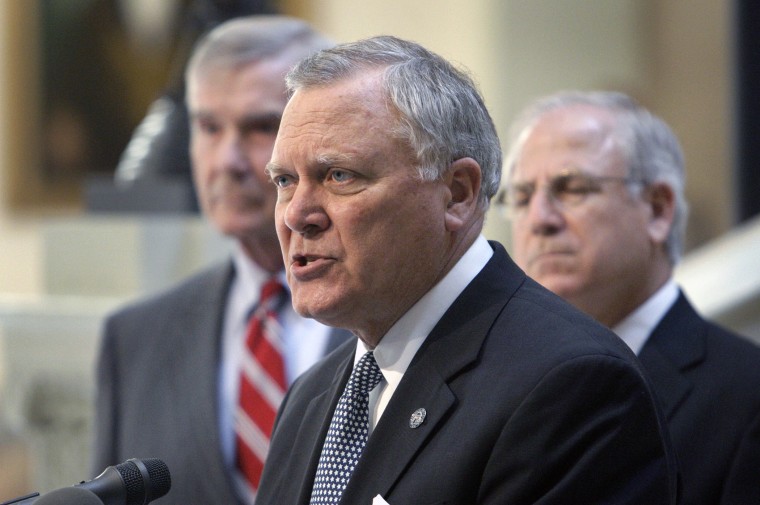We've probably all heard the saying, "A good craftsman never blames his tools." But with that in mind, I have a new maxim to remember: "A good political figure never blames the Bureau of Labor Statistics."
Back in 2012, when the U.S. unemployment rate dropped quickly, President Obama's critics came up with an explanation: administration officials had orchestrated an elaborate conspiracy. The right took this nonsense seriously for a while, though one AEI scholar eventually told conservatives such talk "should be confined to crazytown."
Two years later, some similar suggestions have entered the political bloodstream once again.
Georgia Gov. Nathan Deal, a Republican, says something fishy is going on with his state's unemployment numbers -- and he thinks federal bureaucrats may have something to do with it. The state saw its unemployment rate tick upward in August despite what his administration describes as robust job growth that month. At a public event Thursday, Deal described an inexplicable "influence" on the unemployment rate in Republican-led states.
The Republican governor, who's in the midst of a tough re-election fight, told reporters yesterday, "It's ironic that in a year in which Republican governors are leading some of the states that are making the most progress, that they almost, without exception, are classified as having a bump in their unemployment rates, whereas states that are under Democrat governors' control, they are all showing that their unemployment rate has dropped. And I don't know how you account for that. Maybe there is some influence here that we don't know about."
The Democratic Governors Association and Deal's rivals in Jason Carter's (D) campaign were eager to distribute a clip of the governor's comments.
Let's unpack this a bit because this is an important issue and the public should understand that Georgia's Republican chief executive is, at a minimum, being wildly irresponsible in trying to defend his record.
First, Deal believes the current jobless rates are "ironic." That's not what "irony" means. In fact, it's especially odd to hear a Republican governor eagerly telling the media, in effect, "Unemployment is going up in red states, but down in blue states." Isn't that the sort of thing GOP officials don't want the public to hear?
Second, Deal didn't cite any evidence for the perceived conspiracy, and there's a good reason for that: there isn't any. The fact of the matter is, according to the Bureau of Labor Statistics, many of the states with the lowest unemployment rates -- including each of the top four -- are red states with Republican governors.
If Team Obama is cooking the books to make Republican-run states look bad, it's doing a lousy job.
Third, Team Obama is not cooking the books. It's not even possible. The very idea is plainly ridiculous and Nathan Deal should be embarrassed for suggesting such a thing.
By all appearances, the governor is just embarrassed. Georgia was expecting the jobless rate to inch lower, but instead jumped from 7.7% to 8.1%. Georgia's unemployment rate has been steadily increasing for most of the year and it now has one of the highest jobless rates in the nation. The state is actually in worse shape now than a year ago, unlike most of the country, and Georgia has not kept pace with the national average for job creation.
And that leaves Deal and his team with some rhetorical options. They can stress that these are preliminary numbers, which may improve upon revision -- a defense that may very well be true. They can say the unemployment rate is itself not the best metric for measuring economic success, a claim I'd argue has some merit. The Georgia governor and his aides could even try and convince voters that Deal's record on jobs hasn't been great, but maybe it'll be better if he gets a second term.
What Deal should not do, however, is argue there's some conspiracy, with nefarious officials using their "influence" to make Republicans look bad.
As a substantive matter, that's crazy, and as a political matter, such nonsense makes the governor look desperate.
